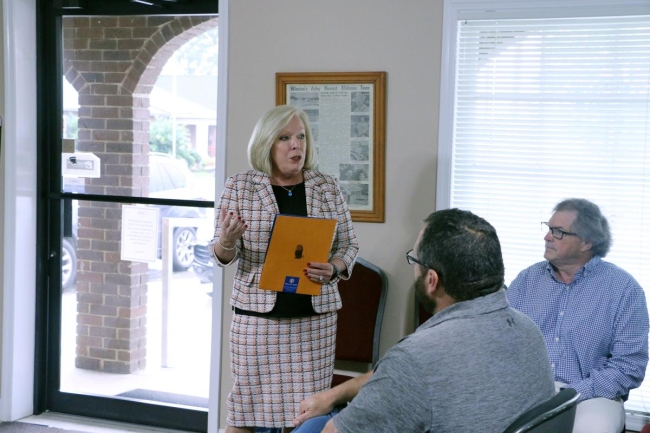You have /5 articles left.
Sign up for a free account or log in.

Wallace State Community College president Vicki Karolewics partnered with Arley Town Council members to plan a new learning center.
Wallace State Community College
Wallace State Community College in Alabama plans to create a community learning center in Arley, a town of approximately 330 people in Winston County, about 45 minutes from the campus.
College administrators spent years reaching out to residents of the county, which Vicki Karolewics, president of the college, described as “extremely rural” with “significant poverty,” but the pandemic intensified that goal as students struggled with remote learning. Even with laptops and Wi-Fi hotspots provided by the college, she said some students were left trying to complete their assignments on their phones because of poor internet access.
Karolewics said the pandemic exacerbated “a long-standing challenge” that demanded “a local solution.”
The focus of the center “will be to place a resident of Winston County who seeks our services … to place them on a career path … at the moment they come in the door.”
Wallace State is among the many community colleges across the country ramping up their outreach beyond the campus in the wake of the pandemic. The institutions are offering classes and programs, academic help, and a variety of support services for community members at off-campus locations. Battered by enrollment declines and lost academic momentum among low-income students weighed down with fresh financial burdens brought on by the pandemic, the colleges are redoubling their efforts to offer community-based opportunities to help current students -- especially adult learners juggling classes alongside work and childcare responsibilities -- to continue their education. The colleges are also using the outreach to encourage other residents to enroll and get new work skills, credentials or degrees.
Karen Stout, president and CEO of Achieving the Dream, a nonprofit organization focused on community college student success, said community college leaders have always focused attention and resources on the needs of their surrounding communities, especially during times of crisis, whether that’s natural disasters or economic downturns. Nonetheless, she sees a “renewed” commitment from colleges to building infrastructure for community outreach.
“It’s always the same members of our communities that are hurt the most,” she said. “It’s those who are marginalized, who have the least resources to respond. So, we reach out and try to support our citizens with services where they are, which end up being community centers, boys’ and girls’ clubs, public libraries, all types of community-based nonprofit organizations that are located in our communities. I do see an acceleration of those types of outreach activities happening now.”
Karolewics hopes Wallace State’s community learning center, which will open in January 2022 with eight classrooms and computer labs, will connect students and residents to campus services. Residents can come to the center to study, take workforce training or dual-enrollment classes and complete the online portions of hybrid courses in the computer labs, saving them time-consuming commutes to campus and searches for reliable Wi-Fi. Adult education and enrollment services staff members will be on the premises to answer questions from students and community members. The Arley Town Council will lease a 4.2-acre property to the college for a dollar per year.
Community College of Beaver County, outside Pittsburgh, is also working with local libraries to bring classes off campus. The college will launch two CCBC Community Classrooms in October at two libraries in nearby neighborhoods where many students live. Plans are in the works to add another library in 2022. First-year students can take their freshman orientation and introductory writing courses at the community classrooms, with on-site childcare for students with children provided by the college. Community members can also enroll in noncredit courses in basic computer skills, résumé writing and other subjects.
Anitre Bell, the college’s community liaison and assistant director of outreach, said the pandemic inspired the community classroom initiative, because the crisis forced administrators to be even more aware of the barriers students face.
“Maybe it’s transportation, maybe it’s affordability, maybe it’s childcare,” she said. “I firmly believe that we have to meet people where they are, and based on the pandemic, things have changed, so we have to find ways to supply those resources for others.”
Dutchess Community College in Poughkeepsie, N.Y., opened an aviation education center this summer at the Hudson Valley Regional Airport for students enrolled in pilot, aviation management and aviation maintenance technician programs. It also launched a new satellite facility in the town of Fishkill, located on a convenient roadway for commuters and equipped with classrooms, computer labs and student lounges. Students can take a variety of courses at the new location.
“It is my sincere hope that this facility, with its superb classrooms and labs, easily accessible location, and welcoming and open learning spaces, will provide our students -- the next generation of pioneers -- the space and support they are going to need as they marshal the resources of education, technology and human ingenuity to forge new solutions for the market challenges they will face,” Ellen Gambino, provost and vice president of academic affairs and student services and former acting president of the College, said in a news release.
Stout, of Achieving the Dream, said these community outreach efforts serve as “portals for recruitment” during a time when community college enrollments continue to drop. Community colleges experienced a decrease of about 10 percent in enrollment between fall 2019 and fall 2020 and a similar drop in spring 2021, according to National Student Clearinghouse Research Center data.
“They are being used for recruitment -- there’s no doubt about that,” she said.
She noted that community-based academic offerings and support services also help potential students feel more connected to their local colleges, introducing them to campus resources in places that may feel more comfortable and familiar.
“These community places are really important because so many of our students don’t have a sense of identity as a college student and a college campus is a strange environment, but they may have been visiting a public library since they were children,” she said. “There’s a different type of identity and sense of belonging, and if we’re able to meet prospective students in that environment, we can create a stronger sense of connection to the college.”
Bell also sees community classrooms as a recruitment and retention tool for Community College of Beaver County. Enrollment at the college fell to 1,713 students in fall 2020 from 2,149 students in fall 2019, a loss of 436 students. She said the “flexibility and convenience” of off-campus courses will be a draw for students.
Victor Moreno, community outreach manager at Atlantic Cape Community College in New Jersey, said the college’s community initiatives aren’t intended to boost enrollment but have attracted interest in the college from Atlantic City residents. The institution recently received a $50,000 Neighborhood Revitalization Tax Credit Planning grant from the New Jersey Department of Community Affairs, which the college will use to partner with residents to create a neighborhood improvement plan along Atlantic City’s Absecon Inlet, a tourist industry hub where some students and their families live.
The neighborhood improvement idea preceded the pandemic, but the college also offered a host of new services to members of the broader community as a result of the public health emergency, including an information session for DACA students and residents, a two-day event with representatives of the Mexican Consulate in Philadelphia to help local Mexican nationals secure updated passports and consular identification, and hot meals from the college’s academy of culinary arts for unhoused people in the area.
Moreno believes recruitment and community outreach “kind of walk hand in hand.”
“Sometimes I’m there just to serve the community … but someone may come up and say, ‘Hey, I’m looking to re-enroll,’ or ‘I didn’t know you were offering free workforce training to Atlantic City residents that are unemployed or underemployed or casino employees,’” he said. “I’m already there to provide that information and meet their needs.”
Karolewics, of Wallace State, said she hopes her college’s community center can have long-lasting effects on not just residents but generations of residents in the surrounding area.
“My goal is to have a more educated citizenry and a highly developed talent pipeline who are ready for high-paying jobs that lead to intergenerational change,” she said. “Because we want to lift people out of poverty and have a more literate society.”









